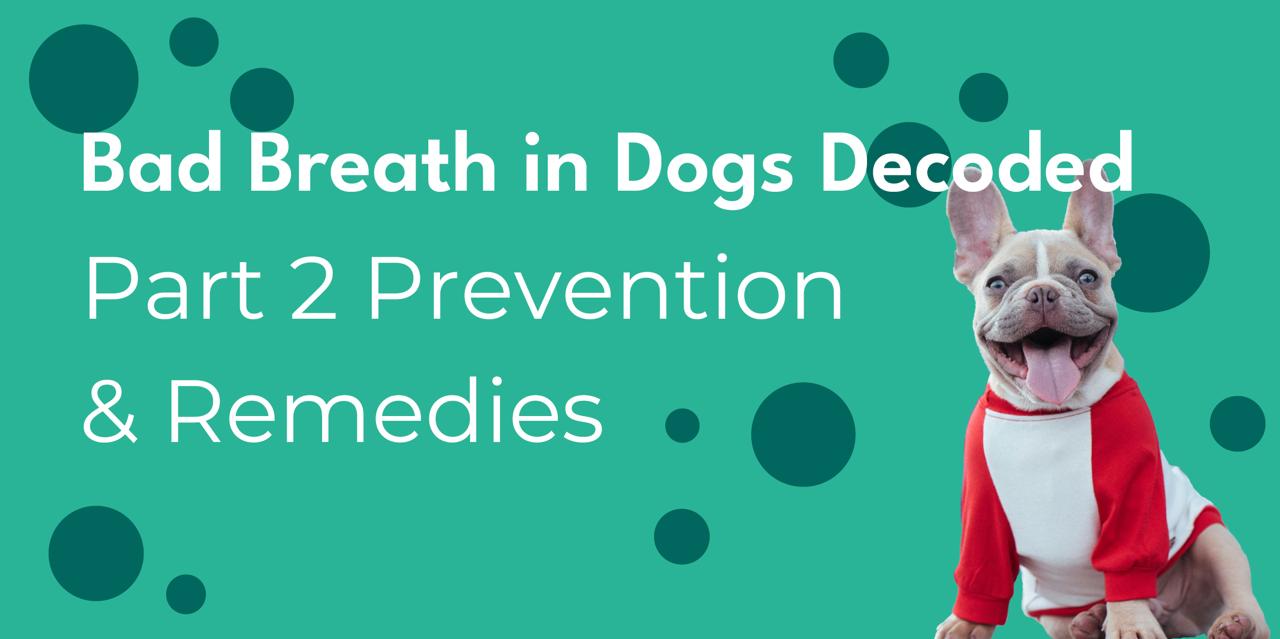

· By Anthony Gatti
Bad Breath in Dogs Decoded: Prevention and Remedies
Welcome back, PetPax fam! Now that we’ve decoded the causes of bad breath in our dogs, it’s time to tackle the next step—prevention and remedies. Preventing bad breath isn’t just about keeping those doggy kisses fresh—it’s about safeguarding your pup’s health from potential dental and systemic issues.
In this week’s PetPax Co. Paper, we’ll explore practical and effective strategies to keep your dog’s breath fresh, their teeth clean, and their overall health in top shape. Here’s how you can stay ahead of the problem with a proactive approach to oral hygiene. Let’s dive in and give our dogs the fresh breath they—and we—deserve!
Proactive Prevention
Regular Brushing
Imagine going days or weeks without brushing your teeth. Yuck, right? The same goes for our dogs. Brushing your dog’s teeth should be a regular part of their grooming routine. It’s not just about freshening their breath; it’s about preventing plaque buildup, which can lead to serious dental issues down the line. Use a toothbrush and toothpaste specifically designed for dogs – human toothpaste can be harmful to them. Aim to brush their teeth several times a week. If your pup isn’t used to it, start slow and make it a positive experience with plenty of praise and maybe even a treat afterward.
Dental Chews and Toys
Dental chews and toys are like the fun version of brushing – they clean your dog’s teeth while they play or enjoy a tasty snack. These products are designed to reduce plaque and tartar buildup by mechanically scrubbing the teeth as your dog chews. Plus, they help keep your dog entertained and engaged, which is a win-win! A lot of chews can contain unhealthy fillers, so it’s important to look for chews that are vet-approved and appropriate for your dog’s size and chewing strength.
Healthy Diet
You’ve probably heard the saying, “You are what you eat.” Well, it applies to dogs too! A healthy diet is crucial in preventing bad breath and maintaining overall oral health. High-quality, nutritious dog food supports your dog’s health from the inside out, including their teeth and gums. Avoid giving them table scraps or low-quality treats that are high in sugar and artificial ingredients or fillers. These can contribute to plaque buildup and bad breath. Instead, opt for wholesome, natural treats that promote dental health.
Regular Vet Check-ups
Even with the best at-home care, regular vet checkups are essential for catching any potential dental issues early. Your veterinarian can perform professional cleanings that reach below the gumline, where regular brushing might not. They can also check for any underlying health problems that might be contributing to bad breath. Think of these checkups as your dog’s version of a routine dental visit – they’re vital for maintaining their oral and overall health.
Remedies
If you’ve noticed your dog’s breath isn’t as fresh as it should be, don’t worry – there are plenty of remedies that can help get things back on track.
Dental Water Additives
Dental water additives can be an easy and effective way to help reduce plaque and freshen your dog’s breath. Simply add the recommended amount to your dog’s water bowl each day. These additives work by targeting the bacteria in your dog’s mouth, reducing the buildup of plaque and tartar over time. It’s an effortless addition to your dog’s routine that can make a big difference.
Fresh Herbs
Fresh herbs like parsley and mint aren’t just for garnishing your dinner plate – they can also help freshen your dog’s breath! These herbs have natural deodorizing properties that can neutralize bad odors. You can add a small amount of chopped parsley or mint to your dog’s food, or look for treats that include these ingredients. Just be sure to use them in moderation.
Probiotics
A healthy gut means a healthy mouth! Probiotics can help balance the bacteria in your dog’s gut, which in turn can improve their breath. These beneficial bacteria support your dog’s digestive health and can reduce the occurrence of bad breath caused by gastrointestinal issues. Look for dog-specific probiotic supplements or foods that contain probiotics.
Coconut Oil
Coconut oil is a natural antibacterial agent that can improve your dog’s oral health. You can add a small amount to their food or even use it to brush their teeth. The antibacterial properties of coconut oil help to reduce the bacteria in your dog’s mouth, which can lead to fresher breath. Plus, most dogs love the taste, so it’s an easy addition to their routine.
Professional Dental Cleaning
If your dog’s bad breath persists despite your best efforts, it might be time for a professional dental cleaning. This is especially important if you notice other signs of dental disease, such as red or swollen gums, difficulty eating, or loose teeth. Your vet can clean below the gumline and address any dental issues that may be contributing to the problem. Regular professional cleanings are a critical component of maintaining your dog’s oral health, particularly as they age.
Final Thoughts
Preventing and treating bad breath in dogs is about more than just ensuring those doggy kisses are enjoyable – it’s about protecting your pet’s health. Regular brushing, a healthy diet, vet check-ups, and the right dental products can all play a role in keeping your dog’s dog’s breath fresh and their smile bright. Remember, good oral hygiene is key to preventing more serious health issues down the road, so make it a priority in your dog’s care routine. Your pup will thank you with fresh, happy kisses!
Written by Rhea Chandrachud
